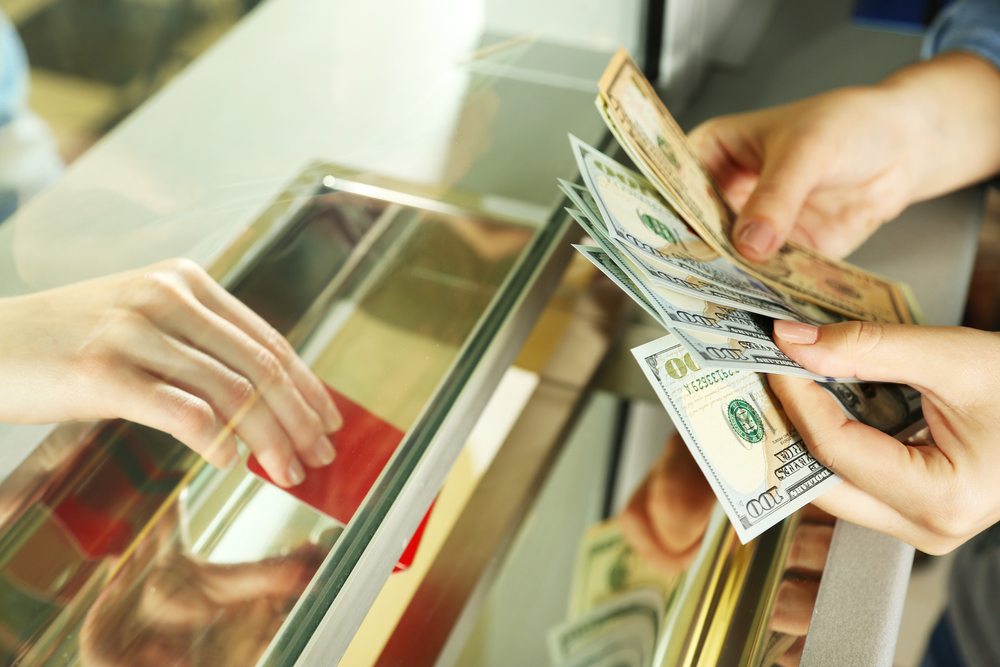How much cash can you legally withdraw?

Can I withdraw $20000 from bank
Unless your bank has set a withdrawal limit of its own, you are free to take as much out of your bank account as you would like. It is, after all, your money. Here's the catch: If you withdraw $10,000 or more, it will trigger federal reporting requirements.
Cached
How much cash can you withdraw from a bank in one day
Your ATM Withdrawal and Daily Debt Purchase limit will typically vary from $300 to $2,500 depending on who you bank with and what kind of account you have. There are no monetary limits for withdrawals from savings accounts, but federal law does limit the number of savings withdrawals to six each month.
How do I withdraw large amounts of cash
If for whatever reason you need more cash than ATM limits allow, there are a few ways you can get around it:Request an increase in your daily limit.Make a withdrawal in person at a bank branch.Get a cash advance with a credit or debit card.Get cash back with a purchase at a store.
Can I withdraw $2000 in cash
You may only withdraw a specific amount of cash from an ATM daily. Most financial institutions have a daily ATM withdrawal limit of $300 to $3,000. If you need to withdraw more money from your account, get cash back from a store or visit a branch. Compare the best free checking accounts.
What is the $3000 rule
Rule. The requirement that financial institutions verify and record the identity of each cash purchaser of money orders and bank, cashier's, and traveler's checks in excess of $3,000.
Can a bank refuse to let you withdraw money
refuse to cash my check There is no federal law that requires a bank to cash a check, even a government check. Some banks only cash checks if you have an account at the bank. Other banks will cash checks for non-customers, but they may charge a fee.
Can banks ask why you are withdrawing money
Yes. The bank may be asking for additional information because federal law requires banks to complete forms for large and/or suspicious transactions as a way to flag possible money laundering.
Can I withdraw $5000 from bank
The amount of cash you can withdraw from a bank in a single day will depend on the bank's cash withdrawal policy. Your bank may allow you to withdraw $5,000, $10,000 or even $20,000 in cash per day. Or your daily cash withdrawal limits may be well below these amounts.
What happens when you withdraw $10000 in cash
If you withdraw $10,000 or more, federal law requires the bank to report it to the IRS in an effort to prevent money laundering and tax evasion.
Do banks report withdrawals to IRS
Banks must report any deposits and withdrawals that they receive of more than $10,000 to the Internal Revenue Service. Financial institutions must also provide regulators other documentation, such as currency transaction reports, which could be used to reconstruct the nature of the transactions.
Is depositing 3000 cash suspicious
As mentioned, you can deposit large amounts of cash without raising suspicion as long as you have nothing to hide. The teller will take down your identification details and will use this information to file a Currency Transaction Report that will be sent to the IRS.
What happens when you withdraw $10 000
If you withdraw $10,000 or more, federal law requires the bank to report it to the IRS in an effort to prevent money laundering and tax evasion. Few, if any, banks set withdrawal limits on a savings account.
What’s the most money you can withdraw from a bank without it being reported
If you withdraw $10,000 or more, federal law requires the bank to report it to the IRS in an effort to prevent money laundering and tax evasion. Few, if any, banks set withdrawal limits on a savings account.
Will the bank red flag my account if I withdraw $8000 cash
If you withdraw $10,000 or more, federal law requires the bank to report it to the IRS in an effort to prevent money laundering and tax evasion. Few, if any, banks set withdrawal limits on a savings account.
Can I deposit $5000 cash in bank
How much cash can you deposit You can deposit as much as you need to, but your financial institution may be required to report your deposit to the federal government.
How big of a cash deposit can I make without being flagged
Banks must report cash deposits totaling $10,000 or more
When banks receive cash deposits of more than $10,000, they're required to report it by electronically filing a Currency Transaction Report (CTR). This federal requirement is outlined in the Bank Secrecy Act (BSA).
Is depositing $2,000 in cash suspicious
Financial institutions are required to report cash deposits of $10,000 or more to the Financial Crimes Enforcement Network (FinCEN) in the United States, and also structuring to avoid the $10,000 threshold is also considered suspicious and reportable.
What happens if I deposit 5000 cash in bank
Depending on the situation, deposits smaller than $10,000 can also get the attention of the IRS. For example, if you usually have less than $1,000 in a checking account or savings account, and all of a sudden, you make bank deposits worth $5,000, the bank will likely file a suspicious activity report on your deposit.



